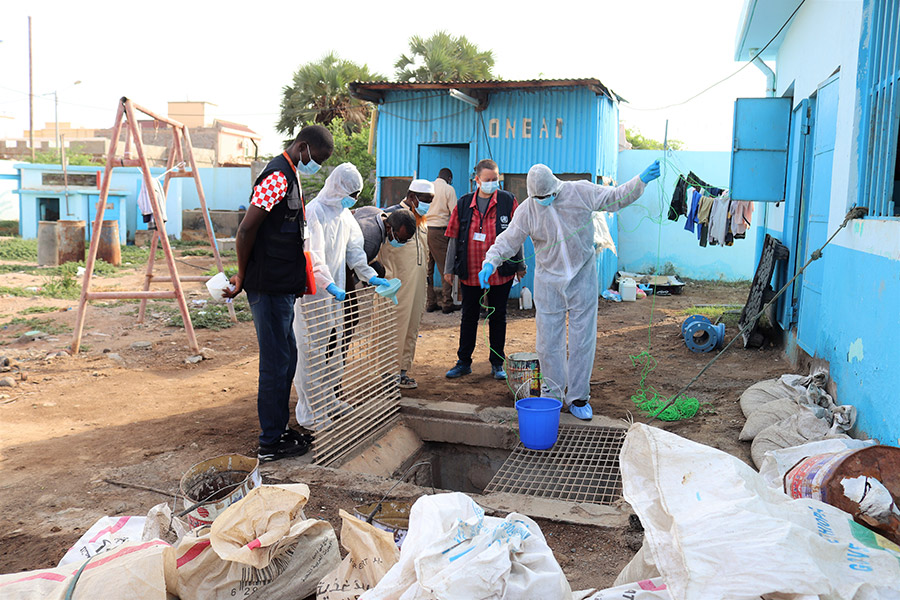 In 2021, the polio programme in Djibouti initiated environmental surveillance to complement AFP surveillance and strengthen the detection of polioviruses.
In 2021, the polio programme in Djibouti initiated environmental surveillance to complement AFP surveillance and strengthen the detection of polioviruses.
Djibouti has not recorded any polio cases since 1999. Although Djibouti was declared polio-free in 2002, there are outbreaks of vaccine-derived poliovirus type 2 in other countries in the region, which underscores the risk to all children in the Horn of Africa.
cVDPV2 was detected through environmental surveillance in two separate sites between 3 October 2021 and 27 February 2022 and the country responded by launching two rounds of a national vaccination campaign using novel oral polio vaccine type 2 (nOPV2) in February and March 2022, each round reaching more than 150,000 children under the age of five.
In both campaign rounds, 378 multidisciplinary vaccination teams – each composed of a vaccinator, a registrar, social mobilizers and supervisors– trained by UNICEF and WHO experts spent five days crisscrossing every neighborhood and doing house-to-house visits in Djibouti’s cities and in more remote localities in order to reach and vaccinate every child.
By carrying out this campaign, Djibouti’s Ministry of Health is protecting all children within its borders from this disease.
With outbreaks of circulating vaccine-derived poliovirus type 2 (cVDPV2) occurring in Yemen, Somalia, Sudan and across the broader Horn of Africa, and with regular mass population movements both within Djibouti and across the country’s borders, the polio programme is working with the Government of Djibouti to mitigate these risks.
Raising immunity levels in at-risk populations
A key aspect of risk mitigation has been around building immunity. Djibouti is a small country: just over a million people, with 129 393 children aged under 5. Although some Djiboutians are pastoral, nomadic or otherwise on the move, the largest at-risk populations in Djibouti are those passing through the country as they move around the Horn of Africa and through countries where polio transmission is occurring.
Djibouti has a robust routine immunization programme, delivered through the country’s public health system. Djibouti became the Region’s second country to use novel oral polio vaccine type 2 (nOPV2) in February 2022, when it carried out round 1 of a national vaccination campaign. Round two took place in the last week of March 2022.
Polio surveillance in Djibouti
In 2018, as Somalia’s twin cVDPV2 and cVDPV3 outbreaks were gathering speed, the regional polio programme targeted acute flaccid paralysis (AFP) surveillance support to Djibouti, rolling out additional training to health workers throughout the country. Training was followed by intensified support including through the distribution of information, education and communication tools and aide-memoires to raise and maintain the standard of AFP surveillance. Today, Djibouti has 33 zero reporting sites, where passive surveillance takes place, and 77 active reporting sites, where active reporting takes place.
On 1 August 2021, the polio programme initiated environmental surveillance in Djibouti city to detect the virus even in the absence of human polio cases. In July 2021, regional-level technical experts led classroom training sessions and on-site, hands-on training for collectors to ensure the appropriate skills were in place, particularly around using PPE and maintaining reverse cold chain as the sample moves from the site to the Kenya Medical Research Institute (KEMRI) lab in Nairobi.
Collection takes place at two sites, Arhiba, in Djibouti district, and Douda, in Arta district, 12km from Djibouti town centre. Both collection sites are part of the closed sewage system.


